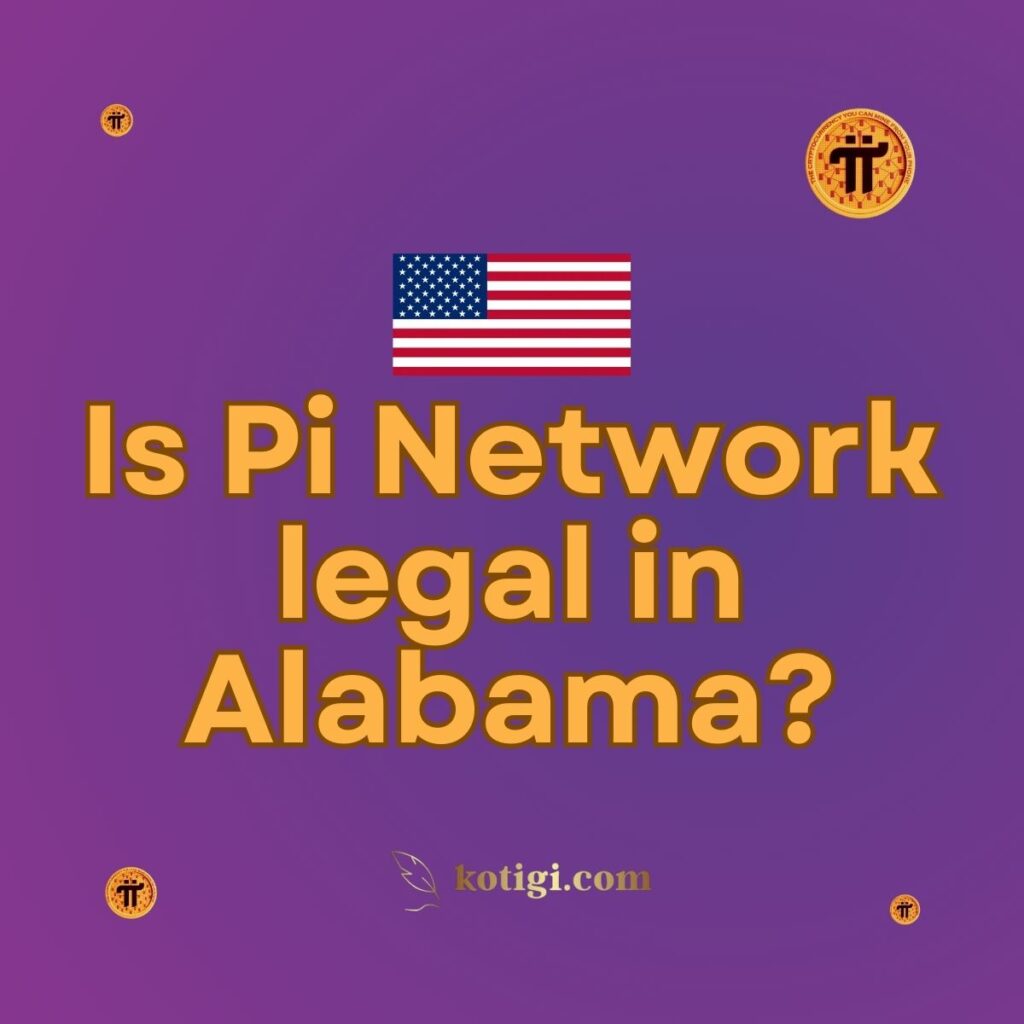
Is Pi Network legal in Alabama?
Yes, Pi Network is currently legal in Alabama, as there are no specific state laws regulating its use. However, users are subject to federal cryptocurrency regulations, including tax obligations and anti-money laundering laws, which apply to all U.S. residents engaging in digital currencies.
Introduction
Pi Network, a decentralized cryptocurrency, has garnered significant attention worldwide, attracting millions of users across various countries, including the United States. With a large and growing user base, many people are keen to understand the legal framework surrounding Pi Network, especially in states like Alabama where digital currency laws may not be clearly defined. While Alabama, like many other U.S. states, has yet to enact specific regulations for Pi Network or cryptocurrencies in general, residents of the state are still subject to overarching federal laws concerning digital currencies.
Understanding the legal landscape for Pi Network in Alabama requires a closer look at both the state and federal regulatory frameworks. Although the state lacks explicit cryptocurrency regulations, users must comply with federal guidelines, which oversee important aspects such as taxation, anti-money laundering practices, and Know Your Customer (KYC) requirements. Moreover, as cryptocurrencies continue to grow in popularity, the legal environment is expected to evolve, potentially introducing new state-level regulations that could affect how Pi Network is used in Alabama.
This article will explore the legal status of Pi Network in Alabama, delving into current regulations, federal oversight, potential legal risks, and the opportunities it presents for users. By examining the broader cryptocurrency framework, this post aims to provide a comprehensive understanding of what Alabama residents can expect when using Pi Network and how they can navigate potential legal challenges.
1. Overview of Cryptocurrency Regulations in Alabama
While some U.S. states have enacted robust regulatory frameworks governing cryptocurrencies, Alabama has remained relatively quiet on the matter. At the moment, there are no state-specific laws or regulatory bodies overseeing the use of Pi Network or other cryptocurrencies in Alabama. This lack of formal state regulation creates both opportunities and risks for residents.
1.1 Absence of State-Specific Cryptocurrency Laws
Unlike states such as New York, which have established licensing frameworks like the BitLicense, Alabama does not have any specific laws that govern the operation of cryptocurrency platforms or the activities of users. The absence of state-specific cryptocurrency legislation creates an environment where digital currencies like Pi Network can operate without facing significant state oversight. However, this can also be viewed as a legal grey area, where the state’s silence on the matter leaves room for future regulatory changes that could significantly impact Pi Network users.
In this regulatory vacuum, residents of Alabama are free to use Pi Network without obtaining any special permissions or licenses. This ease of access is a double-edged sword. On one hand, the absence of heavy regulation makes it simpler for people to participate in the Pi Network ecosystem without legal barriers. On the other hand, it exposes users to a lack of legal protections, as there are no specific state laws to provide recourse in the event of disputes or fraudulent activities involving Pi Network or other cryptocurrencies.
1.2 General Cryptocurrency Guidelines in Alabama
Even though there are no cryptocurrency-specific laws in Alabama, the state still adheres to general business laws that apply to various forms of commerce, including digital currencies. These laws encompass basic consumer protections, fraud prevention, and contract enforcement, all of which could indirectly apply to the use of Pi Network. However, without clear cryptocurrency regulations, Pi Network users in Alabama might find it difficult to seek legal recourse if they encounter issues like lost funds, hacking, or platform malfunctions.
Alabama residents must also consider that while Pi Network is not subject to state-specific regulations, the platform still operates within the broader context of U.S. financial regulations. This means that federal laws, including those governing taxation, anti-money laundering, and consumer protection, still apply to all transactions conducted via Pi Network in Alabama.
1.3 Potential for Future Cryptocurrency Regulations
As cryptocurrency continues to grow in popularity, there is a strong likelihood that Alabama will eventually introduce regulations specific to digital currencies. Many states have already begun to consider how best to regulate and manage the rise of decentralized digital assets. While Alabama has not yet followed suit, the possibility of future regulatory changes is a reality that Pi Network users should be prepared for.
If the state were to implement cryptocurrency laws, it would likely model them after other states’ frameworks. For instance, Alabama could introduce a licensing system similar to New York’s BitLicense, which requires crypto platforms to comply with stringent regulatory standards. Another possibility is that Alabama could follow the example of states like Wyoming, which have taken a more crypto-friendly approach by passing legislation that encourages blockchain innovation while still maintaining regulatory oversight.
In either scenario, new laws could introduce a layer of complexity for Pi Network users in Alabama. Whether these laws impose additional requirements or provide clearer protections for users remains to be seen, but it’s crucial for users to stay informed about potential legal developments that could impact their activities on the platform.
2. Federal Regulations Impacting Pi Network in Alabama
Even though Alabama lacks specific cryptocurrency laws, users in the state are still subject to federal regulations that govern cryptocurrencies like Pi Network. Federal laws set the groundwork for how digital assets are treated across the United States, ensuring a consistent regulatory approach for activities involving cryptocurrency, including in Alabama.
2.1 Compliance with Anti-Money Laundering (AML) Laws
Pi Network users in Alabama must comply with federal Anti-Money Laundering (AML) regulations. These laws are designed to prevent the use of cryptocurrency platforms for illicit activities such as money laundering and terrorism financing. In compliance with AML laws, platforms like Pi Network are required to implement protocols that monitor transactions, verify the identity of users, and report suspicious activities to federal authorities.
For Pi Network users, this means they will likely be subject to Know Your Customer (KYC) processes, where they must provide identification and other personal information to verify their identity before fully engaging with the platform. While this adds a layer of oversight, it is crucial for ensuring the legal use of Pi Network and protecting against criminal exploitation.
2.2 Tax Obligations for Pi Network Users
One of the most significant federal regulations affecting Pi Network users in Alabama is the requirement to report and pay taxes on cryptocurrency transactions. The Internal Revenue Service (IRS) classifies cryptocurrencies as property, meaning that Pi Network transactions are subject to capital gains taxes just like other assets, such as stocks or real estate.
Pi Network users in Alabama need to be aware of how their activities on the platform could result in taxable events. Whether they are mining Pi, transacting with it, or exchanging it for goods and services, users must keep track of their gains and losses. Failing to accurately report cryptocurrency activities to the IRS could result in penalties, fines, or even legal action. Therefore, it’s essential for Pi Network users to maintain thorough records of all transactions and seek professional tax advice if needed.
2.3 Securities Regulations and Pi Network
Another area of federal regulation that could impact Pi Network in Alabama is securities law. The U.S. Securities and Exchange Commission (SEC) oversees securities and investments, and has been increasingly focused on determining whether certain cryptocurrencies qualify as securities under federal law. If Pi Network were to be classified as a security, it would be subject to a more stringent regulatory framework, which could affect its operation and the way users engage with the platform.
While Pi Network currently operates as a decentralized cryptocurrency rather than a security, federal regulatory authorities continue to scrutinize the space. Should the SEC decide to classify Pi Network as a security, it could impose additional regulatory burdens on the platform and its users, including compliance with securities registration requirements and investor protection laws.
3. Legal Risks Associated with Pi Network in Alabama
Despite the absence of state-specific cryptocurrency laws in Alabama, Pi Network users still face several legal risks. Understanding these risks is essential for anyone engaging with the platform in the state.
3.1 Risk of Regulatory Changes
One of the most prominent legal risks for Pi Network users in Alabama is the possibility of sudden regulatory changes. The legal landscape surrounding cryptocurrencies is evolving rapidly, and new laws or regulations could be introduced at both the state and federal levels. If Alabama were to implement new cryptocurrency regulations, users may need to adapt quickly, potentially altering how they interact with Pi Network or requiring compliance with new requirements.
3.2 Fraud and Scams
As with any cryptocurrency, Pi Network users are vulnerable to fraud and scams. The decentralized nature of cryptocurrencies, combined with the lack of state-level regulation in Alabama, makes it easier for bad actors to take advantage of unsuspecting users. Pi Network users must remain vigilant and be aware of common cryptocurrency scams, such as phishing attacks, fake investment schemes, and fraudulent platforms posing as legitimate Pi Network partners.
3.3 Data Privacy Concerns
Pi Network, like many other digital platforms, collects user data to comply with AML and KYC regulations. While these processes are necessary to meet legal requirements, they also raise concerns about data privacy. Users in Alabama should carefully review Pi Network’s data privacy policies and ensure they are comfortable with the platform’s handling of their personal information. Additionally, it’s important to understand that data breaches could result in the exposure of sensitive information, posing further legal risks.
4. Opportunities for Pi Network Users in Alabama
Despite the legal risks, there are numerous opportunities for Pi Network users in Alabama to benefit from the platform. As cryptocurrencies continue to gain mainstream acceptance, Pi Network offers Alabama residents a chance to participate in the future of digital finance.
4.1 Access to a Global Decentralized Network
One of the most significant advantages of using Pi Network in Alabama is the ability to access a global, decentralized financial network. Unlike traditional banking systems, which are heavily regulated and centralized, Pi Network allows users to engage with the cryptocurrency ecosystem without the need for intermediaries. This can provide users with more control over their finances and access to innovative financial services that are not available through traditional banking channels.
4.2 Low-Cost Transactions
Pi Network aims to offer users the ability to conduct transactions with minimal fees compared to traditional financial institutions. This low-cost structure is particularly beneficial for residents in Alabama who engage in international transactions, as it eliminates the need for expensive cross-border transaction fees imposed by banks.
4.3 Potential for Investment Growth
Another opportunity for Pi Network users in Alabama is the potential for investment growth. While Pi Network is still in its early stages, the platform has a growing user base and increasing visibility in the cryptocurrency space. Early adopters in Alabama may find that the Pi tokens they have mined or acquired could appreciate in value over time, offering a new avenue for investment diversification.
5. Future Legal Considerations for Pi Network in Alabama
As cryptocurrencies like Pi Network continue to evolve, the legal landscape in Alabama will likely change as well. It is crucial for users in the state to stay informed about potential regulatory developments that could impact their use of the platform.
5.1 Potential for State-Level Regulation
As discussed earlier, Alabama has not yet introduced cryptocurrency-specific regulations, but this could change in the coming years. Lawmakers may choose to implement a regulatory framework to better manage the growth of digital currencies and ensure consumer protection. If this occurs, Pi Network users in Alabama will need to adapt to the new legal requirements, which could include additional KYC processes, taxation guidelines, or licensing requirements for platforms.
5.2 Federal Oversight and Enforcement
Federal agencies like the SEC and IRS are expected to continue playing a significant role in regulating cryptocurrencies. Alabama residents using Pi Network will need to remain compliant with federal tax obligations, securities laws, and AML requirements to avoid legal repercussions. Users should also stay up to date on any changes to federal cryptocurrency laws that could affect their use of the platform.
Conclusion
In summary, Pi Network is currently legal in Alabama, but users must navigate a complex web of federal regulations and be mindful of potential future state-level laws. The absence of specific cryptocurrency regulations in Alabama provides both opportunities and risks for Pi Network users. By understanding the existing federal framework and staying informed about potential legal developments, residents of Alabama can safely engage with Pi Network while minimizing legal risks.
Key Takeaways
- Pi Network is legal in Alabama, but users must comply with federal regulations such as AML laws and tax obligations.
- The absence of state-specific cryptocurrency laws in Alabama creates a legal grey area, but also allows for easier participation in Pi Network.
- Federal agencies like the IRS and SEC play a crucial role in regulating cryptocurrency activities, which impact Pi Network users in Alabama.
- Users in Alabama should remain vigilant about potential legal risks, including fraud, data privacy issues, and regulatory changes.
- Pi Network offers opportunities for low-cost transactions, access to a global decentralized network, and potential investment growth for users in Alabama.




